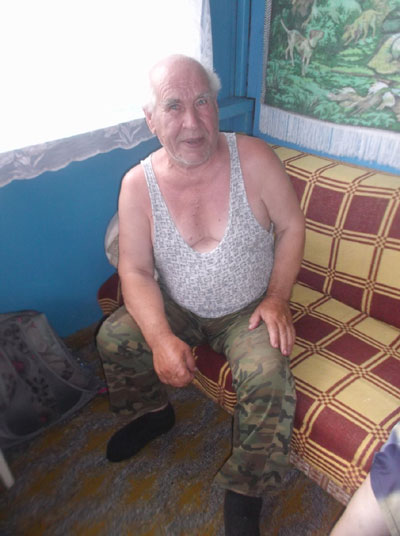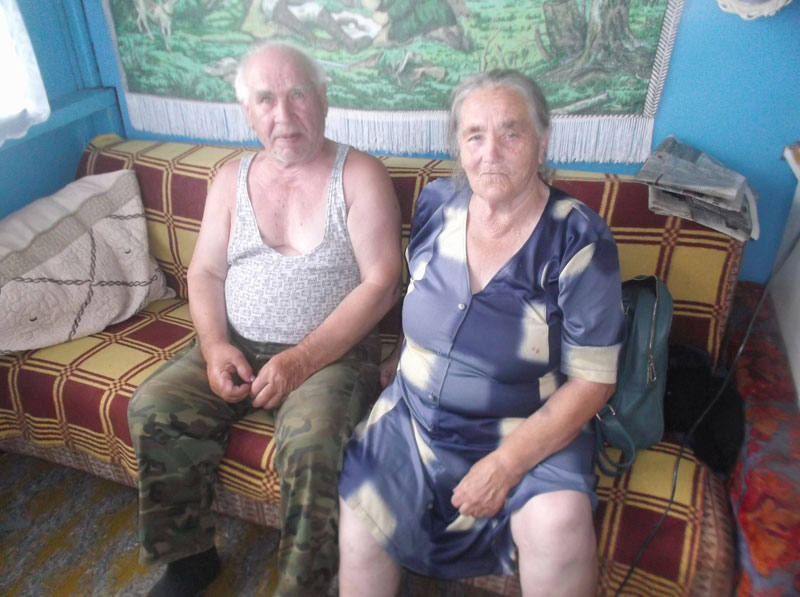









 Josef Josefovich Scheck was born in Saratov Region, village of Wiesenmiller (Wiesenmüller),
canton of Seelmann, in 1939. His father was Julius Friedrichovich Scheck, his
mother Emma Fyodorovna Schekel. She worked for the bread shop, his father for
the mill. They had two children. They owned pigs, cows, well-filled granaries, a
garden and a melon field; they prospered. Most of the villagers were Germans;
there was even a church. The notification about their re-settlement came all of
a sudden.
Josef Josefovich Scheck was born in Saratov Region, village of Wiesenmiller (Wiesenmüller),
canton of Seelmann, in 1939. His father was Julius Friedrichovich Scheck, his
mother Emma Fyodorovna Schekel. She worked for the bread shop, his father for
the mill. They had two children. They owned pigs, cows, well-filled granaries, a
garden and a melon field; they prospered. Most of the villagers were Germans;
there was even a church. The notification about their re-settlement came all of
a sudden.
They started the trip to their new place of residence on carts; afterwards they were to board freight cars. J.J. has great difficulties to recall the events, for he learned everything from what his mother told him: he was a little child at that time - just two years old.
Father, mother and the two children were taken to Daursk District situated not far from Krasnoyarsk (nowadays Balakhtinsk District). They only took along the mostly needed things – cushions, a blanket, underwear for the children and meat, which they had doused with melted fat. They had to leave behind all their cattle; it ran around, desperately roaring, looking for its master. Everything stayed with those who were the commanders-in-chief of the whole scenery, and these commandants also ordered them not to look back. J.J. recalls that some Germans received new cattle in Siberia – as a replacement of the animals lost as a consequence of their deportation.
Housing was tolerable to some extent. Calamity began, when they came to mobilize the father into the labor army. „And Mum and her relatives (brothers and sisters) left for Turukhansk District. Mum had two children at that time. Father was in the labor army near „Taiga“ train station. He was released in 1945. According to what the uncle reported, the prisoners were awfully maltreated: once they had even put a man’s head into the latrine pit, shaking it to and fro“. (About the father he said: „He returned from the labor army at the end of the war. He arrived at home, ate to repletion and died the following day”).
The mother went to the far North – 20 km away from Turukhansk. The village was called Jakuty, the kolkhoz farm „Komsomol“. They were dropped on the riverbank with the words: „This is where you will live from now on“, although there were just three houses in the village. There was a barrack and one single female local resident. Winter set in, and they did not know, where to find shelter. Worried and deeply grieved they started to build dug-outs to live in. The mother worked for a fishery collective. Her salary was not more than a tiny crumb, and, to make matters worse, somebody came along and forced her to buy bonds and confirm this by signature. A nagan pistol was lying in front of her on the table – how could she have refused to accept and sign. Besides they were illiterate and did not understand anything at all. Later the costs were deducted from their salary, and in the end they neither received money nor anything else. Late in the 1950s they earned 10 to 15 Rubles. The biggest amount I recall was 30 Rubles.
Although the mother was working for the fishing industry, she was not allowed to take a single piece of fish home. The brigade leader, a youngster of about18 years, watched us carefully with an automatic rifle in his hands, although we would not have the slightest chance to escape: in the summer there was the broad river, during winter-time snow and severe frost. Whenever someone fainted, he would approach him and start to beat him with the butt, in order to compel him to get up at once. The fishes were to be at least ten centimeters in size, the smaller ones had to be thrown back into the water or to the riverbank; in any case they were not allowed to take the tiniest piece of fish for themselves. It happened that somebody who tried to hide some fish anyway, was seriously beat by the brigade leader with the butt.
During the war we had to suffer a lot. In the winter, when we awoke in the morning, the window panes were all covered by ice. We scraped it off with our finger nails, in order to be able to look outside. It was bitterly cold, a strong wind was blowing - it was horrible. (When our respondent left the room for a short while, his wife told us: „Josef reported that it was colt to such an extent that urine was frozen to the boards of his plank bed in the morning“).
Later they housed us in a barrack; there were three boards in each corner – our plank beds, where we were now supposed to make our home: one plank bed per family.
I the summer we, the youngster, used to crawl on all fours through the fields to nosh delicious herbs. There was a school in the settlement. At first the other children behaved in a fearful way towards us. But all sorts of things could happen – they also insulted and beat us. However, we kept our chins up, and in the course of time everything turned out to be fine. We picked up the Russian language in wintertime. The teacher’s family name was Lebedeva; she was a good woman, who even fed us at her own expense. The school building was situated right next door, so that, even in the winter, we went there bar-footed – as we did not possess any shoes.
We lived in great poverty; there was nothing to chew, to eat. Once, however, they prepared gingerbread on the kolkhoz farm for New Year’s Eve and allowed the children to eat some of them. After school we used to enjoy games of dice, “twelve sticks” and others. Moreover we built sledges.
The parents had to get registered with the commandant once a month who would come to the colony for this purpose. Nobody was allowed to leave the settlement without express permission.
And when someone died, his corpse was hastily buried in the snow and stayed there until spring – how else should they have buried him in the permafrost ground? Thus, the deceased people lay all in piles and heaps.
After the war life became slightly easier – the people began to clear the soil and organize vegetable gardens. (An annotation made by our respondent confirms that they grew potatoes and vegetables). The head of the kolkhoz farm was replaced by a German who’s family name was Werner; before the resettlement he had been a public prosecutor; here in Yakutia he now became head of the kolkhoz farm. Under his rule life became easier: the people were allotted a piece of land, which they cleared at once. Four hectares of land belonged to the kolkhoz farm in all.
In the Volga region crop yields had been much better than hear. They had grown beets for the cattle; they had a sweet taste, and they had made jelly from them. But as often as they tried to grow these beets here – they were always putrefied from the roots. They were steamed, roasted or boiled.
In the cause of the conversation with our respondent we also brought up the subject of Stalin. Traditionally we asked for the day of Stalin‘s death, the 5th of March 1953. „It was a day like any other, - J. J. replied. – We formed a line, everybody cried, both adults and children.
„I could not have imagined any better leader. He won the war – and that is a big honor. No, I am not angry with him and I do not bear hatred towards him. I have seen so many heads of state, but I would have shouted encouragement to none of them. Since Stalin’s death there have been so many rises in price. During Stalin’s rule people were happy about things getting cheaper and cheaper, but as soon as he was dead, prices begin to increase year by year. “.
J. J. has the following attitude towards the deportation of his parents: they made no efforts to revolt against it. Everybody understood that the country was at war and that they had to proceed this way. They were told that they would leave for a short time only.
„In 1956 we moved to Kasachinsk district, to the village of Zakharovka; the mother’s sister lived there. My uncle travelled to the Volga region, his old homeland. He was not even allowed to have a look into his parental home. There are rumors that numerous suicides were committed because of this. We have relatives in Germany, but where should I leave for? My sick mother lives here, my children have grown up here… I can look back to a working life of 40 years. I have almost completely forgotten about the Volga.
The Schecks think that meanwhile their family has become all international: the daughter is married to a Russian, one of the sons has a German wife, the other two got married to Ukrainian and Polish wives.
What do you think are the typical characteristics of your, the Germans, nation? – we asked J. J.
- I suppose it is diligence, culture, law-abiding behavior, neatness. I think that is all, although, in my opinion, there are no bad or good nations, after all!
The interview was recorded by Kristina Fomina and Kristina Bachina, students of the first semester with the Department of Arts and Graphics of the Pedagogic College.

11th expedition of folklore, history and ethnography of the College of Pedagogics in Yenisseisk.